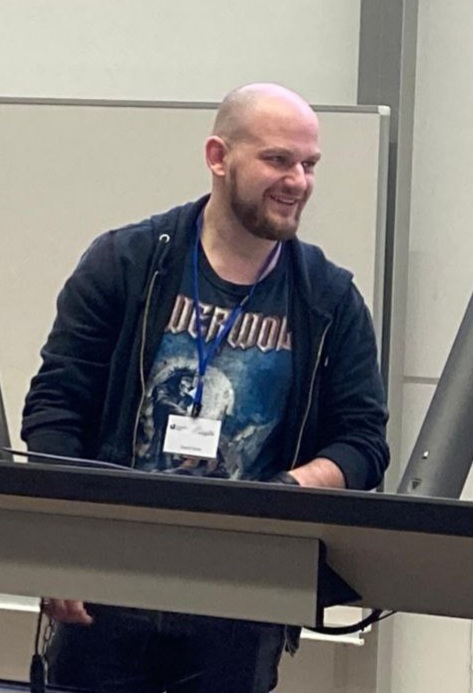Mathematics
Master of Science (M.Sc.)
The master’s program provides advanced mathematical and communication skills, enabling students to apply these competencies effectively within interdisciplinary teams. It prepares graduates for intensive scientific work, teaching roles, and the ability to evaluate and innovate new methods.

Shape Your Future, Starting in Siegen
The two-year master's program in Mathematics is open to students holding a Bachelor of Science in Mathematics or an equivalent degree. The program leads to the academic degree of Master of Science in four semesters.
Selection can be made between the following application disciplines:
- Natural Science and Technology (Computer Science, Mechanical Engineering, or Physics)
- Business Mathematics (Economics or Business Information Systems)
- Philosophy (German language ONLY)
The selected discipline represents approx. 30% of the discipline.
The master’s program provides advanced mathematical and communication skills, enabling students to apply these competencies effectively within interdisciplinary teams. It prepares graduates for intensive scientific work, teaching roles, and the ability to evaluate and innovate new methods.
The course develops skills in analyzing abstract structures and in identifying, formulating, and solving problems both in mathematics and in a chosen minor subject.
Subsequent doctoral studies (Dr. rer. nat.) are possible.
Career Prospects
Career options for mathematicians are wide-ranging, spanning fields such as risk assessment, financial modeling, algorithm development, medical diagnostics, non-destructive materials testing, numerical simulation and optimization of complex systems, as well as data and process analysis.
Typical employers include
- Banks and insurers
- Industrial research and development departments
- Health services and the public sector
- IT and software industry
- Consulting companies
- Market analysis institutes
- Logistics companies
Student Voices: Insights into the Mathematics Program

The program was undeniably challenging, but it was also engaging and multifaceted.
I have always been drawn to numbers and the ways they connect to one another. That interest led me to participate in extracurricular mathematics activities during my school years. After graduating, I began with a traditional banking apprenticeship, where my affinity for numbers and abstract thinking was already a great advantage. I then pursued a degree in mathematics, concentrating in economics, and completed my Bachelor of Science.
The program was undeniably challenging, but it was also engaging and multifaceted. Alongside a wide range of lectures and areas of specialization, students were offered mathematics-related social activities, such as a trip to Rome or a visit to the Mathematikum.
After finishing my bachelor’s, I moved directly into the master’s program, shifting my focus toward computer science. Since my career goal is to bring together mathematics and computer science, studying mathematics at the University of Siegen has provided me with an excellent foundation for the future.
Bachelor's degree in mathematics or at least an equivalent degree at a university. The degree program must involve at least 81 CP of mathematical skills, of which the following areas must be covered to the specified minimum extent:
- Analysis I-III (27 CP)
- Linear Algebra I (9 CP)
- Numerical Analysis I (9 CP)
- Stochastics I (9 CP)
The achievements must be comparable to those of the bachelor's degree program in Mathematics at the University of Siegen.
If the above-mentioned minimum scope cannot be demonstrated, admission to the master's degree program is dependent on additional coursework and examinations from the bachelor's degree program.
A further prerequisite for admission is proof of English language proficiency at level B2 of the Common European Framework of Reference for Languages (CEFR).
2) The Examination Board may admit applicants who have completed a Bachelor's examination in another subject or with another minor subject to the master's degree program subject to additional proof of achievement and subject-specific examinations from the bachelor's degree program.
3) The Examination Board may admit applicants who have obtained the entrance qualification for universities of applied sciences, a bachelor's degree from a university within the scope of the German Civil Code, or a degree equivalent to the master's degree program dependent on additional assessments and subject-specific examinations from the bachelor's degree program in Mathematics at the University of Siegen.
The currently valid examination regulations apply.
Important information
*Courses without international students are held in German.
Examination regulations/curriculum/module handbooks/internship regulations
Examination regulations (Prüfungsordnungen, POs) define the basic structures of a degree program (e.g. admission requirements and content to be studied). Students are automatically subject to the current version of their PO when they enroll for their first semester. This means that even if the PO changes during your studies, the original version according to which you enrolled remains valid (provided the PO does not expire).
The respective study plan represents the recommended model course of study in the individual subjects and is part of a PO.
Supplementary regulations and details on the individual modules to be studied can be found in the module handbook (e.g. requirements for taking an examation or information on the content of the modules/events, ...).
The internship regulations define the conditions under which the compulsory or optional internships must be completed.
We recommend that you at least consult the study plan for your degree program before the start of lectures to ensure that you know which modules are planned at the beginning of your studies.
Why choose mathematics at the University of Siegen?
- Individual mentorship right from the start of your studies, from faculty and/or students in higher semesters
- No overcrowded courses or waiting times for seminar slots
- Opportunity to work on research projects during your studies
- Easy access to lectures, literature, and computer workstations
- Opportunity to gain practical experience through cooperation with financial institutions and industry partners

